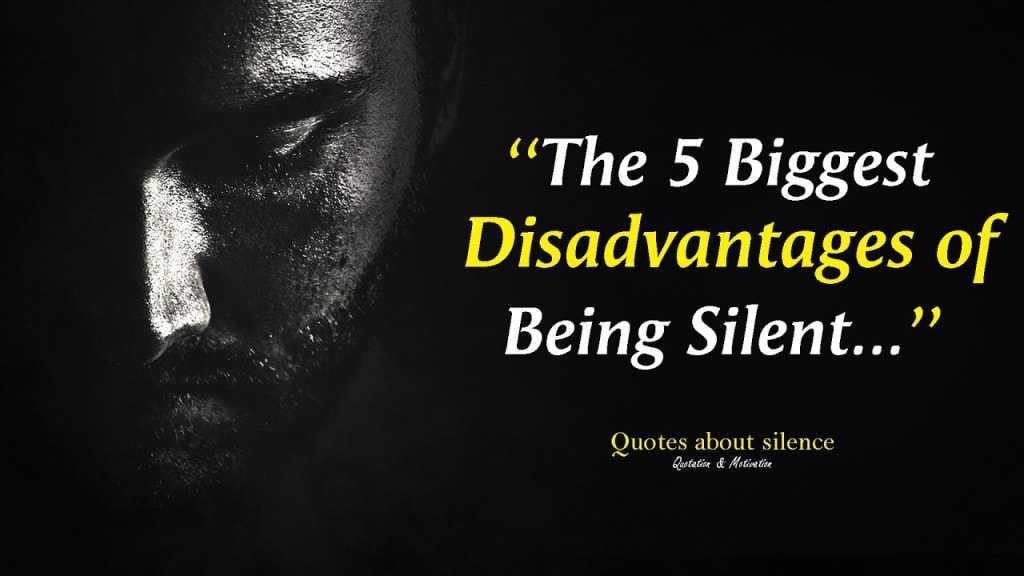"The 5 Biggest Disadvantages of Being Silent..."
Disadvantages of Being Silent

Article Outline
Introduction
Benefits of silence
Disadvantages of being silent
Benefits of Silence
1. Silence helps you focus on your goals
2. Silence helps you become a conscious person by reducing mental stress
3. Silence helps you become a successful person
4. Silence connects you to your lord
Disadvantages of Being Silent
1. People will think you are an arrogant person
2. People will think that you are a shy person
3. People will not be friends with you because it is difficult for them to understand and know you
4. People will use you for their own purposes because a quiet person is usually seen as a good person
5. People will terrorize and bully you because they know you won't fight back
When to Remain Silent
1. When no one can understand your feelings with words
2. When you don't know what to say or have doubts about your thoughts and knowledge
3. When you don't want to be a part of negative criticism
4. When someone is angry and ranting, you can calm them down
5. When someone else is emotionally sharing some of their life events
Conclusion
Importance of using silence at the right time and in the right circumstances
FAQs
1. Is it always beneficial to remain silent?
2. How can silence help in achieving success?
3. How can silence connect you to your spiritual beliefs?
4. Can being silent lead to misunderstandings?
5. How can one find the right balance between silence and communication?
Four Major Disadvantages of Being Silent That Can Completely Ruin Your Life
Silence is often considered a virtue, a moment of tranquility in a world filled with noise. It allows us to reflect, introspect, and find solace within ourselves. However, silence is not always golden. Today, we will shed light on the four major disadvantages of being silent that can have detrimental effects on your life. Before we dive into these drawbacks, let's take a moment to explore the benefits of silence, which will help us gain a better understanding of ourselves.
Four Major Benefits of Silence
1. Silence Helps You Focus on Your Goals
In the midst of a chaotic world, silence becomes a powerful tool to align your thoughts and concentrate on your aspirations. By embracing silence, you create a conducive environment for goal setting, planning, and channeling your energy towards achieving success. It allows you to drown out distractions, clear your mind, and pave the way for clarity of purpose.
2. Silence Helps You Become a Conscious Person by Reducing Mental Stress
Modern life is brimming with constant stimulation, information overload, and never-ending mental chatter. Silence acts as a sanctuary where you can find respite from the noise. It offers an opportunity to disconnect, recharge, and reduce mental stress. Embracing silence enables you to become more self-aware, mindful, and attuned to your emotions, leading to a greater sense of inner peace and well-being.
3. Silence Helps You Become a Successful Person
Silence is not merely the absence of sound; it is a state of mind that cultivates self-discipline and fosters personal growth. By practicing silence, you develop patience, resilience, and the ability to listen attentively. These qualities are essential for success in any endeavor. Silence empowers you to observe, learn from others, and make informed decisions based on a deeper understanding of the situations at hand.
4. Silence Connects You to Your Lord
For many, silence is a sacred space where they connect with their spirituality. It allows for introspection, prayer, and a sense of transcendence. By embracing silence, you create a bridge between the material world and the realm of
the divine. It provides solace, guidance, and a deeper connection to your spiritual beliefs.
Now, let us delve into the darker side of silence and explore the four major disadvantages that can have profound negative consequences on your life.
The Five Biggest Disadvantages of Being Silent
1. People Will Think You Are an Arrogant Person
In a world that values assertiveness and self-expression, remaining silent can be misinterpreted as arrogance or superiority. People may perceive your silence as a form of aloofness, making it difficult for them to approach or connect with you. This misconception can hinder meaningful relationships and opportunities for personal and professional growth.
2. People Will Think That You Are a Shy Person
Silence often gives rise to assumptions, and one common misconception is that silent individuals are inherently shy or lack confidence. While introversion and shyness are not synonymous, being silent can lead others to believe that you are timid or lacking in social skills. This can result in missed chances to showcase your abilities and be recognized for your true potential.
3. People Will Not Be Friends With You Because It Is Difficult for Them to Understand and Know You
Communication is the bedrock of human connection. By choosing silence over dialogue, you create barriers between yourself and others. People thrive on meaningful conversations and shared experiences, and when you remain silent, it becomes challenging for them to understand your thoughts, feelings, and perspectives. This can create a sense of detachment, making it harder to form and maintain genuine friendships.
4. People Will Use You for Their Own Purposes Because a Quiet Person Is Usually Seen as a Good Person
Silent individuals often emanate an air of reliability and trustworthiness. Unfortunately, this can make you vulnerable to exploitation. People may take advantage of your silence, perceiving you as a passive and compliant person who will readily acquiesce to their demands. This can lead to being used for others' personal gain without consideration for your own well-being.
5. People Will Terrorize and Bully You Because They Know You Won't Fight Back
Silence can be mistaken for weakness, and unfortunately, some individuals prey upon this perception. Bullies and oppressors may target silent individuals, knowing that they are unlikely to retaliate or defend themselves. This can lead to enduring mistreatment, psychological distress, and a loss of self-confidence. It is crucial to find the balance between silence and assertiveness to protect yourself from such harm.
While silence can be a virtue when used judiciously, it is essential to recognize its limitations and the potential harm it can cause. Remaining silent all the time can prevent you from expressing your true self, standing up for your values, and asserting your rights. It is crucial to embrace effective communication and find your voice when faced with situations that challenge your beliefs or values.
When to Remain Silent
While there are disadvantages to being silent, there are also instances when silence is a powerful choice. Here are five situations where remaining silent can be beneficial:
1. When No One Can Understand Your Feelings With Words
At times, emotions transcend language, and attempting to articulate them may feel futile. In such moments, silence becomes a sanctuary, allowing you to communicate through presence, empathy, and nonverbal cues. Your silent support can convey more than words ever could.
2. When You Don't Know What to Say or Have Doubts About Your Thoughts and Knowledge
Silence is an ally when faced with uncertainty or a lack of clarity. It gives you the space to reflect, gather your thoughts, and gain a deeper understanding before expressing yourself. Embracing silence in these situations allows you to avoid hasty or ill-informed responses.
3. When You Don't Want to Be a Part of Negative Criticism
Engaging in gossip, backbiting, or negative criticism can poison relationships and create an atmosphere of toxicity. By remaining silent in the face of such negativity, you choose not to contribute to the harm being inflicted on others. Your silence can be a powerful statement, signaling your refusal to partake in destructive behavior.
4. When Someone Is Angry and Ranting, You Can Calm Them Down
Silence can act as a calming force in the midst of heated arguments or conflicts. When others are consumed by anger or hate, your composed and quiet demeanor can defuse tension and provide an opportunity for rational dialogue to emerge. Your silence becomes a bridge to reconciliation and understanding.
5. When Someone Else Is Emotionally Sharing Some of Their Life Events
There are moments when the best support we can offer is a listening ear. By remaining silent, you create space for others to express themselves fully. Your attentive silence demonstrates empathy and compassion, allowing them to share their joys, sorrows, and experiences without interruption.
Remember, silence is a tool to be used consciously and judiciously. It is a valuable aspect of communication but should not be wielded at the expense of your voice, self-expression, or personal boundaries.
Conclusion
Silence possesses both benefits and disadvantages. It is a powerful tool for self-reflection, focus, and spirituality. However, when practiced excessively or inappropriately, silence can isolate, hinder personal growth, and invite exploitation. Striking a balance between silence and communication is crucial to leading a fulfilling and empowered life.
Embrace the power of silence when it aligns with your values and intentions. Choose your moments of silence wisely, and let your voice be heard when it matters most. Find the courage to speak up, defend your beliefs, and assert your identity, ensuring that silence becomes a tool that empowers rather than limits you.
FAQs
1. Is it always beneficial to remain silent?
While silence has its advantages, it is not always beneficial to remain silent. It is important to assess each situation individually and consider the potential consequences of staying silent. Effective communication and finding the right balance between silence and expression are key to healthy interactions.
2. How can silence help in achieving success?
Silence provides an environment for focused thought, goal setting, and self-reflection. It allows you to block out distractions and concentrate on your objectives, leading to enhanced productivity, clarity, and ultimately, success.
3. How can silence connect you to your spiritual beliefs?
Silence creates an opportunity for introspection, prayer, and connection with one's spiritual beliefs. By embracing silence, individuals can quiet their minds, cultivate a sense of inner peace, and deepen their spiritual connection.
4. Can being silent lead to misunderstandings?
Yes, remaining silent can lead to misunderstandings, as it may prevent others from understanding your thoughts, feelings, or intentions. It is important to find a balance between silence and effective communication to avoid misconceptions and foster genuine understanding.
5. How can one find the right balance between silence and communication?
Finding the right balance between silence and communication requires self-awareness, active listening, and assertiveness. It involves recognizing when silence is appropriate and when speaking up is necessary to express oneself, set boundaries, and maintain healthy relationships.
Please show your support and appreciation by liking this prompt if you have found it truly helpful.





Comments
There are no comments for this story
Be the first to respond and start the conversation.